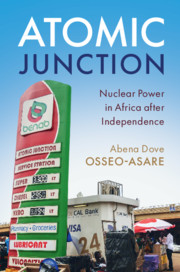Book contents
- Atomic Junction
- Atomic Junction
- Copyright page
- Epigraph
- Contents
- Figures
- Preface: Nuclear Reveries
- Acknowledgments
- Abbreviations
- 1 Introduction: “No Country has Monopoly of Ability”
- 2 Nuclear Winds: Particles without Boundaries
- 3 Scientific Equity: Physics from the Soviets
- 4 Atomic Reactors: A Fission Facility for Ghana
- 5 Radiation Within: Monitoring Particles in Bodies
- 6 Atomic Lands: Risks on a Nuclear Frontier
- Epilogue: Nuclear Power at the Crossroads
- Notes
- Persons Cited and Consulted
- Works Cited and Consulted
- Index
4 - Atomic Reactors: A Fission Facility for Ghana
Published online by Cambridge University Press: 12 September 2019
- Atomic Junction
- Atomic Junction
- Copyright page
- Epigraph
- Contents
- Figures
- Preface: Nuclear Reveries
- Acknowledgments
- Abbreviations
- 1 Introduction: “No Country has Monopoly of Ability”
- 2 Nuclear Winds: Particles without Boundaries
- 3 Scientific Equity: Physics from the Soviets
- 4 Atomic Reactors: A Fission Facility for Ghana
- 5 Radiation Within: Monitoring Particles in Bodies
- 6 Atomic Lands: Risks on a Nuclear Frontier
- Epilogue: Nuclear Power at the Crossroads
- Notes
- Persons Cited and Consulted
- Works Cited and Consulted
- Index
Summary
This chapter shows how Ghanaian scientists tapped resources from different countries in their quest for a nuclear reactor, from the United Kingdom and the Soviet Union, to Canada, the United Arab Republic, India, and China. While many people living near Ghana’s Atomic Energy Commission believe the site has hosted a reactor since around 1966, it actually took several more decades to install the first low power research reactor, the GHARR-1, at Kwabenya. Nkrumah’s bid to obtain a reactor provoked the wrath of France, the United States, and the United Kingdom, all of whom backed the coup d’état against him. It then considers how subsequent governments tried to rekindle the Soviet nuclear reactor initiative and explored other possible reactors from Western powers, but finally settled on a Chinese offer. The chapter relies on a variety of sources including GAEC records, British spy reports, and correspondence between Nkrumah and Khrushchev of the Soviet Union. The chapter provides critical insights, including difficulties the Ghanaian government had in maintaining payments to the Soviets, problems with the storage of the unfinished reactor components while post-Nkrumah regimes mothballed the nuclear program, and several subsequent contracts for reactors that fell apart due to political instability.
Keywords
- Type
- Chapter
- Information
- Atomic JunctionNuclear Power in Africa after Independence, pp. 77 - 106Publisher: Cambridge University PressPrint publication year: 2019

